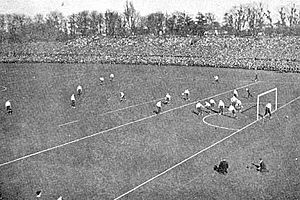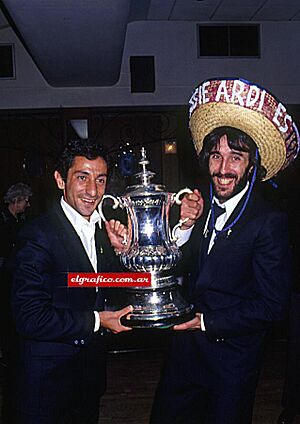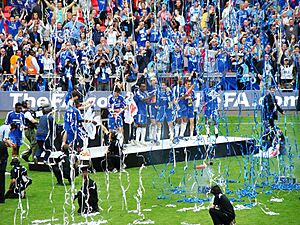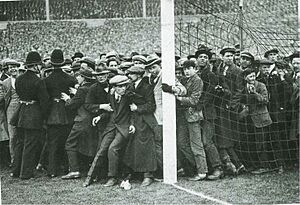History of the FA Cup facts for kids
The FA Cup is a famous football competition in England. Its history goes all the way back to 1871–72. Except for breaks during the First and Second World Wars, the tournament has been played every single year.
For a full list of FA Cup winners, you can check out the list of FA Cup finals.
Contents
The FA Cup's Amazing History
How the FA Cup Started in the 1800s
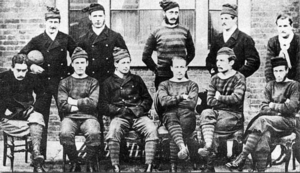
On July 20, 1871, a man named C. W. Alcock suggested a great idea. He proposed to The Football Association (FA) that they should create a "Challenge Cup." This cup would be open to all football clubs in the Association. Everyone on the committee agreed to his exciting plan.
The very first FA Cup tournament began in November 1871. After 13 matches, a team called Wanderers won the first final. This historic game took place at Kennington Oval on March 16, 1872. The next year, Wanderers won again! They got a special pass straight to the final, where they beat Oxford University. After that, the rules were changed to make it fairer for other teams.
In 1875, the final between Royal Engineers and Old Etonians was played twice. The first game ended in a 1–1 draw after extra time. The replay, played a few days later, saw Royal Engineers win 2–0. Both matches were held at Kennington Oval.
By the 1888–89 season, the FA Cup started to look more like it does today. Qualifying rounds were added, where teams played regionally. This helped find the best teams to compete. This season also saw the start of the "magic of the cup." Warwick County became the first non-league team to beat a top-division club, winning 2–1 against Stoke.
Exciting Moments in the 1900s
In 1901, Tottenham Hotspur made history. They became the only non-league club to win the FA Cup after the Football League was formed in 1888. Tottenham was part of the Southern League at the time. The final against Sheffield United at Crystal Palace had a huge crowd of 110,820 fans. This was the biggest crowd ever for a football match back then. The game was a 2–2 draw, and Tottenham won the replay 3–1. This final was also the first to be filmed!
The 1915 final was nicknamed "The Khaki Cup Final." This was because many soldiers in uniform attended the game. Sheffield United beat Chelsea 3–0 at Old Trafford. There were debates about whether the competition should continue during World War I. However, the Football Association decided to carry on to give people a break from the war news. The competition was then stopped for the next year.
The 1923 final was the first to be played at the famous Wembley Stadium. Over 200,000 people tried to squeeze into a stadium meant for 127,000! Many fans even spilled onto the pitch. It took mounted police almost an hour to clear the field before the game could start. Bolton Wanderers beat West Ham 2–0. After this, all Cup Finals became "all ticket" events to control crowds.
In the 1925–26 season, a new rule started. Teams from the top two divisions got to skip the first two rounds and start playing in the third round.
The 1945–1946 FA Cup was the first one played after World War II. For this season only, each match was played over two legs (home and away). This helped clubs earn more money after the war. The final was still a single match, and Derby County won 4–1.
In the 1966–67 FA Cup, substitutes were allowed for the first time. This was important because many finals had been unfair due to players getting injured. Before this, injured players had to stay on the field even if they couldn't play properly. The first substitute in a final was Dennis Clarke in the 1968 FA Cup Final.
The 1970 final was the first Wembley final to need a replay. The replay was played at Old Trafford because the Wembley pitch was damaged. Chelsea played Leeds United.
In 1972, the FA Cup celebrated its 100th birthday! Leeds United won the final against Arsenal. The 1973 FA Cup Final marked Wembley's 50th anniversary as the cup final venue.
The 100th FA Cup final was between Tottenham Hotspur and Manchester City. It ended in a 1–1 draw after extra time. For the first time, the replay was also held at Wembley. Tottenham won the replay 3–2.
In the 1990–91 FA Cup, a match between Arsenal and Leeds United had to be replayed three times! To avoid so many replays, the FA decided on a new rule. From then on, if a game was a draw, there would be one replay, then extra time, and then a penalty shootout if needed.
In 1993, both semi-finals were played at Wembley Stadium for the first time. The last ever FA Cup final replay also happened in 1993. Arsenal beat Sheffield Wednesday 2–1. Arsenal became the first team to win both the FA Cup and the League Cup in the same season.
In 1999, the last ever FA Cup semi-final replay took place. From 2000 onwards, semi-finals and finals would go straight to extra time and then penalties if needed. Also in 1999, Manchester United chose not to defend their FA Cup title. They decided to play in the new FIFA Club World Championship in Brazil instead.
The FA Cup in the 2000s
While the new Wembley Stadium was being built, the FA Cup finals from 2001 to 2006 were played at the Millennium Stadium in Cardiff, Wales.
When the new Wembley Stadium opened, the final returned there. In 2008, it was decided that all future semi-finals would also be played at the new Wembley.
Starting with the 2016–17 competition, quarter-final matches no longer had replays. If they were a draw, they went straight to extra time and then a penalty shootout.
A big change happened for the 2024–25 competition. Replays were completely removed from the first round onwards. This decision was made to reduce how many games teams had to play. However, many smaller clubs were upset. Replays often brought them extra income, and they felt they weren't asked about the change. Even the Prime Minister's deputy spokesman said that replays were "part of the magic of the cup."
Broadcasting the FA Cup
The 1927 final was the first Cup Final ever broadcast by the BBC. They even made a numbered grid for listeners to follow the ball on the pitch.
In 1938, during a match between Preston and Huddersfield, the BBC Radio commentator Thomas Woodrooffe famously said, "If there's a goal scored now, I'll eat my hat." Seconds later, Preston scored from a penalty! Woodrooffe kept his promise. This was also the first FA Cup Final shown live on BBC Television.
Memorable Moments in FA Cup History
The First Tournament Winners
The very first FA Cup tournament started in November 1871. The first four matches were played on November 11, 1871. The first ever Cup goal was scored by Jarvis Kenrick of Clapham Rovers. On March 16, 1872, Wanderers became the first winners of the FA Cup. They beat Royal Engineers 1–0 at The Oval.
The White Horse Final
The first Wembley FA Cup Final on April 28, 1923, was very chaotic. A massive crowd rushed the gates and flooded onto the pitch. The game was delayed for 45 minutes. Mounted police, especially PC George Scorey on his white horse "Billy," helped clear the field. This is why it's known as the "White Horse Final." Bolton beat West Ham 2–0. It's estimated that 200,000 fans squeezed into Wembley that day!
Tragedy at Burnden Park
During a match between Bolton Wanderers and Stoke City on March 9, 1946, 33 spectators sadly died in a crowd crush. Despite this terrible event, the match continued.
The Matthews Final
The 1953 final is famous as the "Matthews Final." It was between Blackpool and Bolton Wanderers. Stanley Matthews, at 38 years old, was trying to win the FA Cup for Blackpool for the third time. Bolton was leading 3–1 with only 22 minutes left. But Blackpool made an amazing comeback! Stan Mortensen scored a hat-trick (three goals), which is still the only one in a Wembley FA Cup Final. Then, Bill Perry scored the winning goal, and Blackpool won 4–3.
Bert Trautmann's Bravery
In the 1956 final, Manchester City beat Birmingham City 3–1. About 15 minutes before the end, Man City's goalkeeper, Bert Trautmann, injured his neck. He had broken a bone in his neck, but he bravely kept playing until the end of the match! He even collected his winner's medal while holding his neck.
The Hillsborough Disaster
In 1989, during an FA Cup semi-final between Liverpool and Nottingham Forest, 96 people tragically died due to overcrowding. This was a very sad day in football history.
Fabrice Muamba's Collapse
On March 17, 2012, a match between Tottenham Hotspur and Bolton Wanderers was stopped. Bolton midfielder Fabrice Muamba suffered a cardiac arrest on the pitch. His heart stopped beating for 78 minutes. He later recovered but had to retire from football.
Underdog Stories and Giant Killings
The FA Cup is famous for its "giant killings," where smaller teams beat much bigger ones.
- In 1894, Notts County became the first club outside the top division to win the FA Cup.
- In 1901, Tottenham Hotspur became the first team from outside the Football League to win the FA Cup since the league began.
- In 1973, Sunderland became the first team from outside the top league to win the Cup since 1931.
- In 1980, West Ham United became the last team from outside the top division to win the competition. They were a Second Division team when they beat Arsenal 1–0.
- In 1989, Sutton United (a non-league club) famously beat Coventry City (a top-division club) 2–1. Coventry had won the Cup just 18 months earlier!
- In 2013, non-league Luton Town beat Premier League side Norwich City away from home. This was the first time a non-league team had beaten a top-flight team away since 1985.
- In 2017, two non-league teams, Lincoln City and Sutton United, reached the fifth round. Lincoln City even made it to the quarter-finals, becoming the first non-league team to do so in 103 years! They beat Premier League team Burnley before losing to Arsenal.
Amazing Comebacks
In 1966, Everton made an incredible comeback. They were two goals down but came back to win 3–2 against Sheffield Wednesday. This was only the second time a team had won the Cup after being two goals down without needing extra time.
FA Cup Records and Statistics
Player Achievements
Most Wins and Final Appearances
Ashley Cole holds the record for most FA Cup wins by a player. He has won it seven times with Arsenal and Chelsea. He has also played in 8 finals.
The manager with the most FA Cup wins is Arsène Wenger, who won it seven times with Arsenal.
Top Goal Scorers
Harry Cursham of Notts County has scored the most goals in FA Cup history, with 49 goals. He has held this record since 1887.
The most goals scored by one player in a single FA Cup season is believed to be 19, by W. "Doc" Dowden for Wimbledon in 1929–30.
Peter Osgood of Chelsea was the last player to score in every round of the Cup in 1970.
In one match, Ted MacDougall scored 9 goals for Bournemouth in their 11–0 victory over Margate.
First Goals and Streaks
In 1876, Thomas Hughes was the first to score more than once in a final replay. Eddie Kelly of Arsenal was the first substitute to score in a final in 1971. In 2001, Tony Roberts, a goalkeeper for Dagenham & Redbridge F.C., became the first goalkeeper to score a goal in the tournament.
Didier Drogba of Chelsea became the first player to score in four FA Cup Finals in 2012.
Fastest Goals
The fastest goal in an FA Cup final was scored by İlkay Gündoğan for Manchester City in 2023. He scored after just 12 seconds!
The fastest goal in the FA Cup proper was scored by Jimmy Kebe for Reading in 2010. He scored after only 9 seconds!
Hat-tricks
William Townley scored the first hat-trick in an FA Cup final in 1890 for Blackburn Rovers. Stan Mortensen scored the third hat-trick in an FA Cup final in 1953 for Blackpool.
Penalty Records
The first penalty in a final was scored in 1910 by Albert Shepherd. In 1988, Dave Beasant of Wimbledon became the first goalkeeper to save a penalty in an FA Cup final at Wembley. He also became the first goalkeeper to captain a winning FA Cup team.
Own Goals
In 1877, Lord Kinnaird scored the first own goal in a final. In 1946, Bert Turner of Charlton Athletic famously scored for both teams in the final! He scored an own goal, then equalized with a free kick a minute later.
Age Records
Billy Hampson of Newcastle United is the oldest FA Cup finalist. He was 41 years old in the 1924 Final. In 1983, Norman Whiteside, at 18 years old, became the youngest player to score in an FA Cup final. In 2004, Curtis Weston of Millwall became the youngest player to play in the final at 17 years old.
Disciplinary Records
In 1985, Kevin Moran of Manchester United was the first player to be sent off in an FA Cup Final.
Injury Records
In the first final in 1872, Edmund Cresswell broke his collarbone but bravely kept playing in goal. Gerry Byrne of Liverpool broke his collarbone in the 1965 final but played on for 87 minutes and extra time, even assisting a goal!
Nationality Firsts
In 1872, Edward Ernest Bowen of Ireland was the first non-Englishman to win the FA Cup. In 1873, American Julian Sturgis was the first person from outside the United Kingdom to win the Cup. In 1997, Ruud Gullit became the first overseas manager to win the FA Cup with Chelsea.
Team Achievements
Most Goals Scored
Kettering Town holds the record for most goals scored in the FA Cup, with 912 goals.
Winning Streaks
Blackburn Rovers won three consecutive FA Cups from 1884 to 1886. They are the only club still around to have done this.
Portsmouth holds the record for holding the FA Cup the longest. This was because the competition was stopped during World War II.
Undefeated Streaks
In 2013, Chelsea set a record of 29 FA Cup matches without defeat. Arsenal holds the record for the most FA Cup trophies, with 14 wins.
Most Final Losses
Manchester United has lost the most FA Cup finals, with nine defeats.
Game Records
In 1903, Bury beat Derby County 6–0 in the final. This record was matched by Manchester City in 2019.
In 1959, Nottingham Forest became the first team to win the final with 10 men after a player was injured.
The longest tie in Cup history was in 1971. Oxford City and Alvechurch played 6 games for a total of 660 minutes!
Quickest Winners
In 1963, Manchester United became the quickest winners. They played their first match on March 4 and won the final on May 25, just 82 days later.
Most Games in a Season
In 1973–74, Bideford played 13 games over five rounds. This record is unlikely to be broken because multiple replays no longer happen.
Penalty Shoot-outs
In 1971–72, Birmingham City became the first team to win a match in a penalty shoot-out. The 2005 FA Cup Final between Arsenal and Manchester United was the first final to be decided by penalties. Arsenal won 5–4.
Winning Doubles and Trebles
- In 1889, Preston North End became the first club to win "the double" (FA Cup and League title) in the same season. They also won the league without losing a single game and the cup without letting in a single goal!
- In 1961, Tottenham Hotspur became the first club in the 20th century to win "the double."
- In 1993, Arsenal was the first team to win both the FA Cup and the League Cup in the same season.
- In 1999, Manchester United achieved "The Treble." They won the FA Cup, the FA Premier League, and the UEFA Champions League.
- In 2019, Manchester City became the first English team to win the "domestic treble." They won the FA Cup, the League Cup, and the Premier League.
Interesting Facts and Oddities
- In 1873, Sheffield won a tie by a coin toss. This is the only time an FA Cup match has been decided this way!
- The only game played on Christmas Day was in 1888, when Linfield Athletic beat Cliftonville 7–0.
- In 1921, Birmingham had the shortest FA Cup run ever – they forgot to send in their entry form!
- In 1931, West Bromwich Albion became the only team to win the FA Cup and get promoted in the same season.
- The 2003 final was the first FA Cup final played under a roof, at the Millennium Stadium in Cardiff.
- In 2013, Wigan Athletic became the first team to win the FA Cup and be relegated from the Premier League in the same season.
Who Plays in the FA Cup?
Amateur, University, and Professional Teams
In 1883, Blackburn Olympic became the first professional club to win the trophy. This was a big moment for football in England. In 2002, Team Bath became the first university team to enter the competition since 1881.
Teams from Other Countries
- In 1884 and 1885, the Scottish team Queen's Park reached the final, but they lost both times.
- In 1927, Cardiff City from Wales won the FA Cup! To this day, they are the only non-English team to win the trophy.
FA Cup Traditions
Ribbons on the Trophy
In 1901, Tottenham was the first team to tie ribbons in their team colours to the trophy. This tradition continues today.
The "Abide With Me" Hymn
Since the 1927 FA Cup Final, the hymn "Abide With Me" has been sung before every final. It's a special part of the tradition.
Numbered Shirts
In the 1933 final, Everton players wore shirts numbered 1–11, and Manchester City players wore 12–22. This was the first major game where players wore numbered shirts.
Royal Visitors
In 1914, George V became the first king to watch the FA Cup Final. The "Matthews Final" of 1953 was the first football match attended by Elizabeth II, in the year she became Queen.
Greatest Goals in FA Cup History
- The fastest goal in a final was scored by İlkay Gündoğan in 2023, after just 12 seconds.
- The 1981 final featured what many consider the greatest ever final goal. Ricky Villa of Tottenham scored after dribbling past several players.
- In 1999, Ryan Giggs of Manchester United scored an amazing goal in extra time against Arsenal. This goal was voted the greatest in FA Cup history in 2003.


